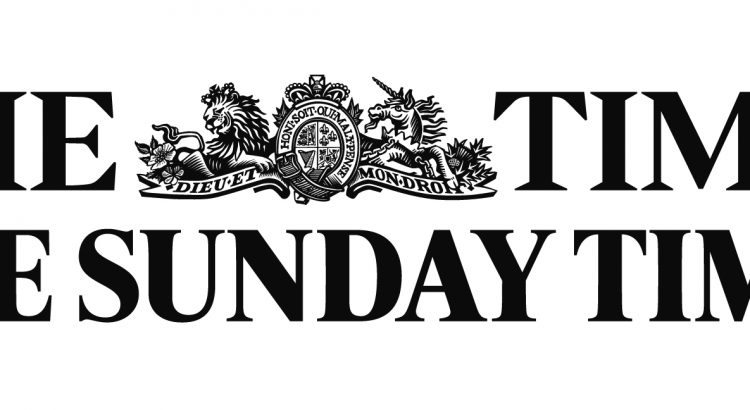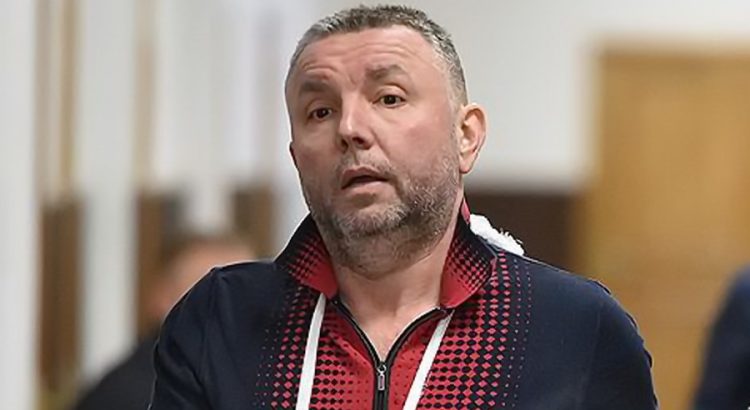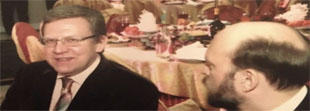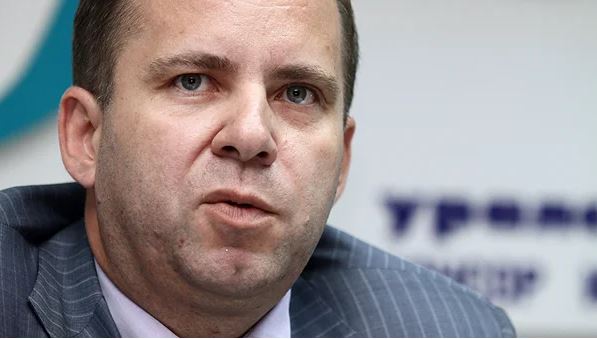It was late in the evening in May 2015, and Sergei Pugachev was flicking through an old family photo album he’d found from 13 years ago or more. In one picture from a birthday party at his Moscow dacha, his son Viktor keeps his eyes downcast as one of Vladimir Putin’s daughter’s smiles and whispers in his ear. In another, Viktor and his other son, Alexander, are posing on a staircase in the Kremlin presidential library with Putin’s two daughters.
We were sitting in the kitchen of Pugachev’s latest residence, a three-storey townhouse in well-heeled Chelsea, southwest London. The late-evening light glanced in through the cathedral-sized windows and birds chirped in the trees outside. The high-powered life Pugachev had once enjoyed in Moscow — the secret deal-making, the “understandings” between friends in the Kremlin corridors of power — seemed a world away. But Moscow’s influence was still lurking like a shadow outside his door.
The day before, Pugachev had been forced to seek the protection of the UK counter-terrorism police. His bodyguards had found suspicious-looking boxes with protruding wires taped underneath his Rolls-Royce (later found to be tracking devices), as well as on the car used to transport his three youngest children to school.
Now, on the wall of the Pugachevs’ sitting room, behind the rocking horse and across from the family portraits, the SO15 counter-terrorism command had installed a grey box containing an alarm that could be activated in the event of attack.
Fifteen years before, Pugachev, a Russian Orthodox believer with a dark beard and broad grin, had been a Kremlin insider who’d manoeuvred endlessly behind the scenes to help bring Vladimir Putin to power. Once known as the Kremlin’s banker, he’d been close to the family of Russia’s first president, Boris Yeltsin. For years he’d seemed untouchable. But now the Kremlin machine he’d once been part of had turned against him. First, the Kremlin had moved in on his business empire, taking it for itself. Pugachev had fled Russia, ending up in Britain, but he still hadn’t felt safe.
And so one day in June 2015, a few weeks after we’d met in his Chelsea home, Pugachev was suddenly no longer in the UK. His phones had all been switched off, ditched by the wayside as he ran. He’d ignored the court orders forbidding him to leave the country. He hadn’t even told his partner and mother of his three children, the London socialite Alexandra Tolstoy, who was left waiting late into the night for him to appear at her father’s 80th birthday party. He’d fled to the relative safety of his villa high in the hills above the bay of Nice, a fortress surrounded by a high iron fence with a team of bodyguards and security cameras at every turn.
Before things had got tough in London, Pugachev had never given an interview on the record in his life. Few knew who he was. Most people believed it was the recently deceased oligarch Boris Berezovsky who had helped bring Putin to power — when in fact Pugachev had treated Putin as his protégé and been instrumental in making him president in 2000.
Now he was speaking out. He and other inner-circle sources I interviewed laid bare how Putin came to power 20 years ago and the rise of the tight-knit clan of KGB men surrounding him. First they enriched themselves and then they began to pose a threat to the West. And there is no sign of it stopping: earlier this month Putin set in train constitutional changes that will enable him to stay in power until 2036 — an autocrat in all but name.
“These people, they are mutants,” said Pugachev. “They are a mixture of Homo sovieticus with the wild capitalists of the past 20 years. They have stolen so much to fill their pockets. All their families live somewhere in London.”
What emerged as a result of Putin’s rise and the KGB takeover not only of the country’s political and legal systems but also the economy was a regime in which the billions of dollars at Putin’s cronies’ disposal were to be actively used to undermine and corrupt the institutions and democracies of the West.
As Vladimir Putin strode alone through the vaulted halls of the Grand Kremlin Palace, he seemed dwarfed by the majesty of the presidential inauguration. Solemn, with a slight smile, downcast gaze and light, lopsided gait, he was dressed in a dark suit that differed little from the garb of an everyday office worker. He’d been trained to be bland and unremarkable, to blend in anywhere. But on this day trumpeters dressed in an imperial uniform of white and gold heralded his entrance, while the state officials who thronged the gilded palace rooms applauded his every step down the red carpet into the glittering Andreyevsky Hall.
It was May 7, 2000, and the kandidat rezident (the spy candidate, cast as a patriot who would restore the Russian state) had arrived in the Kremlin. Putin, a former KGB officer who only eight months before had been just another faceless bureaucrat, was about to take on the mantle of Russian president.
Unnoticed in the mass of officials were the KGB men Putin had brought with him from St Petersburg, where he had been deputy mayor. Among them were KGB-linked businessmen such as Yury Kovalchuk, the former physicist who’d become the largest shareholder in Bank Rossiya, a St Petersburg bank created by the Communist Party in the twilight of the Soviet Union. There too was Gennady Timchenko, an alleged one-time KGB operative who’d worked closely with Putin and held a near monopoly on the city’s oil exports. (Timchenko, however, has denied working for the KGB.) And there was Nikolai Patrushev, the gnarled head of the FSB, successor to the KGB. A year older than Putin, he’d served with him in the St Petersburg KGB’s counter-intelligence division in the late 1970s.
Perhaps the closest to the new president, though, was Igor Sechin. Eight years younger than Putin, he had followed him like a shadow ever since Putin’s appointment as deputy mayor in St Petersburg. He had served as his secretary, standing like a sentry behind a podium in the anteroom leading to Putin’s office. He controlled access to Putin and all the papers Putin saw.
Eventually, said Pugachev, this inner circle made Putin. “They changed him into someone else.” Putin had begun his presidency appearing to pursue liberal economic reforms and a closer relationship with the West. But the initial steps turned out to be short-lived and illusory. “He got disappointed in the US and then he just wanted to get rich,” said Pugachev. The influence of the St Petersburg security men, steeped in the zero-sum thinking of the Cold War, soon began to outweigh all else. The economy was a weapon to be harnessed to further their own power.
All the while Pugachev moved in the shadows watching over his protégé. Pugachev said that in Putin’s first year in office he spent £30m on meeting the Putin family’s every need, down to buying the cutlery they used in their home. He bought apartments for prosecutors to make sure they were under the president’s — and his — control.
Pugachev claimed that he was trying to bring an end to the era when the oligarchs of the Yeltsin years believed they controlled the Kremlin by giving “donations” to Kremlin officials — not realising, perhaps, that essentially he was doing exactly the same.
But the KGB men had long been looking at the situation intently. Vladimir Yakunin, a bluff former KGB officer who’d been close to Putin since the early 1990s, had prepared a study on the ownership of the Russian economy. It found that in 1998-99 almost 50% of the nation’s gross domestic product was produced by companies owned by just eight families. “All the profits were going into private pockets. No taxes were paid,” says Yakunin now, nearly 20 years later. “It was looting, pure and simple. Without greater state involvement, it was clear to me it was a path to nowhere.”
For Putin’s security men, the Yeltsin-era oligarchs’ sending of cash to the West provided a useful argument for shoring up their own power. They could claim that the dominance of the oligarchs was a threat to national security, though it was mostly a threat to their own positions. They saw themselves as the anointed guardians of Russia’s restoration as an imperial power, and believed the resurgence of the state and their own fates were inextricably — and conveniently — linked.
So those close to Putin, his old allies and former KGB associates, began to seize Russia’s prize assets for themselves. One of those who went on to be most successful was Timchenko, who had worked with Putin in St Petersburg — and, some associates suggested, may have had links to him even earlier than that when Putin served in the KGB in Dresden, East Germany.
For a time the rise of Gunvor, an oil-trading company part-owned by Timchenko, was one of the industry’s great mysteries. At first few noticed when Rosneft, a Russian state oil company run by Putin’s ally Sechin, began redirecting the bulk of its exports through Gunvor. Then the state-controlled gas and oil company Gazprom also began awarding large contracts to Gunvor. Cowed by the Kremlin’s growing might, other oil majors, anxious to curry favour, followed suit. Within four years, Gunvor was trading 30% of all seaborne oil exports from Russia.
By 2008 it had become the world’s third-biggest oil trader, with revenues of £35bn. But who owned it? Where did the profits go?
On paper Gunvor was owned by Timchenko and his Swedish business partner, Torbjorn Tornqvist, but also by a third shareholder whose name, the oil trader initially said, could not be revealed. Of all Putin’s close KGB cohorts who were now rising in business, Timchenko had kept the lowest profile. He operated in a world shrouded in secrecy, shuttling between Moscow and Switzerland, where he lived in a mansion surrounded by manicured gardens and a high, guarded fence overlooking Lake Geneva. The business he handled was so sensitive that he never used email. If he spoke by mobile phone, he did so in the full awareness that he was being listened to. He’d never given an interview until 2008, when Gunvor’s meteoric rise forced him into the light. At that point only one photograph of him had ever been seen.
In the early days Timchenko was kept almost invisible, even to those closest to Putin. Pugachev had seen him only once. “Putin had always hidden him from me,” he said. One wintry evening he’d arrived at Putin’s residence outside Moscow to find Timchenko in the kitchen. Putin had ordered Timchenko to wait outside in the snow while they discussed business. It was as if he was trying to demonstrate to Pugachev that Timchenko wasn’t important to him. But to Pugachev it revealed the sensitivity of the relationship between the two men.
The reason for the apparent secrecy became clear to Pugachev when a banker flew in to see him from Switzerland towards the end of 2003. The banker asked him about Timchenko, and said he’d been told that he was a holder of funds for the president: “He told me, ‘There’s a guy named Timchenko and he’s brought us a huge amount of money.’ He told me all this money is Putin’s,” Pugachev said.
Timchenko has always strongly denied that Gunvor’s success had anything to do with the president, insisting it was down to his own business savvy. Putin also swatted away such allegations, once telling reporters they were nonsense “picked out of someone’s nose and smeared on bits of paper”.
For Pugachev, however, the sensitivity and secrecy surrounding Timchenko could mean only one thing: at the beginning of Putin’s presidency, he was the first business ally to hold funds for him.
For two of Timchenko’s former KGB associates and two close Putin allies, the root of Gunvor’s success could lie only in financial connections with the Russian president. “Putin’s money, of course it’s there,” one of them told me. “How else do you think Timchenko became such a billionaire?”
“When Gunvor was created it was 100% Putin’s company,” said a Russian tycoon close to Putin. “Timchenko is just the holder of a purse that has $10bn in its account. He might differ over how much of it is his and how much of it is Putin’s, but really it is all the same.”
Later, the US Treasury Department said flatly that “Putin has investments in Gunvor and may have access to Gunvor funds.” Timchenko, again denying any connection between Gunvor and Putin, called American sanctions against the company no more than an attempt to put pressure on the Russian regime. He had never held or managed assets for Putin, he said.
As with others of the inner circle, Timchenko’s rise was about a lot more than the president’s personal finances. It was about creating a slush fund for Putin’s KGB clan, aimed at preserving and projecting their power. “Of course, in Timchenko’s activities there are some interests of Putin,” said a former senior KGB officer, an associate of the Geneva money men. “But this is not necessarily in the form of some personal money. This can be black cash for funding party activities or a charity fund that can influence the electoral situation. It can be strategic resources.” Putin’s people were replicating the KGB-run systems of the past, in which oil exports had been a key source of black cash to fund the influence campaigns of the Communist Party and clandestine operations abroad.
While the fortunes of Putin’s KGB cohort were rising, men like Pugachev were on the way out. He had become an anachronism, a symbol of a different era, of the Yeltsin years and the transition to Putin. The KGB men had, in Pugachev’s words, “taken over like a tsunami”.
Some time in Putin’s second term Pugachev let go of his office in the Kremlin. He didn’t seem to need it any more and it felt too conspicuous. He’d remained close to some degree with Putin, helping organise a vacation for him and Prince Albert of Monaco in the summer of 2007 in the Siberian wilderness region of Tuva. There the two men fished in the Yenisei River and Putin, famously, posed topless, dressed only in green khaki trousers and wielding a fishing rod.
Yet Pugachev had been unable to kowtow to Putin like the yes-men around him. Always irreverent, he’d often told him what he thought. There’d always been a friction between them, as if Putin resented knowing he was in debt to Pugachev for helping bring him to power.
In the summer of 2008 he received a call from Putin asking him to stump up £270m in loans to help out Putin’s childhood friend Arkady Rotenberg. “He told me, ‘It’s only a loan. It will be paid back to you in six months,’” said Pugachev. Rotenberg had grown up with Putin scrapping on the streets of Leningrad, and then training together at the same judo gym. Although Rotenberg’s business interests had grown after Putin took the presidency, he wasn’t widely known. But that spring Rotenberg acquired a series of construction companies from Gazprom and gathered them under a holding company, Stroigazmontazh. Soon afterwards, Gazprom awarded Stroigazmontazh a multibillion-pound pipeline contract. The deal would make him a billionaire.
The only problem was that by the summer Rotenberg still hadn’t been able to come up with the cash to pay Gazprom for the construction companies. It was then that Putin called Pugachev, who said he’d readily assisted. Putin’s direct interest in the matter made it clear to Pugachev who was really behind Rotenberg’s construction business. “Putin wanted to bring Rotenberg in because he really could control him,” said Pugachev. “He was absolutely his.”
Rotenberg has denied his rising fortune had anything to do with his friendship with Putin. But he fast joined the ranks of Timchenko, Sechin and Kovalchuk as one of the close Putin allies taking over ever greater swathes of the economy. This was the final favour Pugachev did for Putin before he was suddenly thrown out in the cold. When the 2008-09 financial crisis ripped through Russia’s banking system only months after he lent Rotenberg the money, Pugachev found himself in trouble.
The financial institution Mezhprombank, which Pugachev had co-founded (but claimed no longer to be a direct owner of), was left deeply in the red. At first Russia’s central bank had stepped in swiftly, as it had across the entire crisis-hit Russian banking system, providing £1.1bn in bailout loans to keep Mezhprombank afloat. But by summer 2010, when Mezhprombank had still not paid down the central bank’s support, the debt became a mechanism by which Putin sought to seize control of two shipyards owned by Pugachev: Northern Shipyard and Baltiysky Zavod. Putin wanted to create a state shipbuilding corporation.
Then, in October 2010, the central bank suddenly revoked Mezhprombank’s licence after it missed an interest payment. It filed suit to seize the shipyard stakes, and a Moscow court agreed behind closed doors to their sale for a fraction of their value to the state-controlled United Shipbuilding Corporation.
Once again the court system had allowed Putin’s allies to acquire strategic assets on the cheap.
Pugachev was soon facing the loss of the rest of his assets. The state began a criminal investigation alleging that he had caused Mezhprombank’s bankruptcy when he transferred £450m from an account he held at the bank into a Swiss account at the height of the crisis in 2008. The man who’d manoeuvred to bring Putin to the Kremlin had become expendable. Pugachev no longer fitted the regime’s objectives; he was no longer judged to be sufficiently loyal.
In September 2014, we were sitting in Pugachev’s office in Knightsbridge, central London, a playground for Russia’s rich. Pugachev said he wished he’d never rented an office there. “It’s disgusting,” he said. The concentration of Russian cash in the square mile around him was a bitter reminder of how deep Russia’s reach into the London elite had become.
The power of the Russian cash that had poured into Europe over the past decade was also becoming visible in the rifts between European Union countries over how far economic sanctions, imposed against Russia after its invasion of Crimea, should go. In the UK, a Foreign Office official was photographed with a briefing paper arguing that Britain must not “close London’s financial centre to Russians”.
For Pugachev, the danger was clear. The system of black cash to corrupt and buy off officials had extended to all the Russian billionaires who acted as fronts at the Kremlin’s command. “They all get calls to send money for this and for that. They all say, ‘We’ll give it. What else do you need?’ This is the system. It all depends on the first person, because he has unlimited power.”
For Pugachev, his manoeuvring to help propel Putin to power 20 years ago is now a constant source of remorse and regret. “I’ve learnt an important lesson,” he said when we talked at his home in France. “And that is: power is sacred. We all thought the people weren’t ready [for full democracy], and we would install Putin . . . Of course, we thought it was cool. We thought we’d saved the country from the communists.”
In the rush to help install Putin, though, Pugachev had ignored warnings that appointing someone from the KGB was “to enter a vicious circle”.
Those who believed they were working to introduce a free market and democracy had underestimated the enduring power of the security men.
“This is the tragedy of Russia,” said Pugachev.
Adapted from Putin’s People: How the KGB Took Back Russia and Then Took on the West by Catherine Belton (William Collins £25)


















